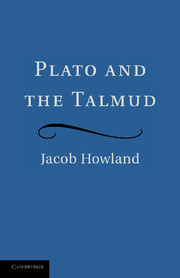Book contents
- Frontmatter
- Contents
- Acknowledgments
- Introduction: Athens and Jerusalem
- 1 Talmudic and Platonic Writing
- 2 Rabbis and Holy Men
- 3 Prophets and Philosophers
- 4 Fathers and Sons
- 5 Words and Deeds
- 6 Gods and Men
- 7 Miracles and Necessity
- Epilogue: Texts and Traditions
- Works Cited
- Index to Biblical and Rabbinic Texts
- General Index
7 - Miracles and Necessity
Published online by Cambridge University Press: 10 November 2010
- Frontmatter
- Contents
- Acknowledgments
- Introduction: Athens and Jerusalem
- 1 Talmudic and Platonic Writing
- 2 Rabbis and Holy Men
- 3 Prophets and Philosophers
- 4 Fathers and Sons
- 5 Words and Deeds
- 6 Gods and Men
- 7 Miracles and Necessity
- Epilogue: Texts and Traditions
- Works Cited
- Index to Biblical and Rabbinic Texts
- General Index
Summary
The Platonic dialogues offer several different versions of Socrates' understanding of things divine. In the Republic, it is the Good that inspires in him a sense of sacred awe. In the Symposium, Socrates relates that the priestess Diotima described philosophy to him as an initiation into the mysteries, not of the Good, but of the Beautiful (to kalon: 201d–12a). Like the Ideas, the Good and the Beautiful are intelligible beings that are accessible to the human mind through philosophical inquiry; as such, they are distinct from the other divinities of which Socrates regularly speaks – the gods. In the great myth Socrates tells in the Phaedrus, the gods serve as a model for the ascent of the soul through philosophy. They journey to the roof of the cosmos, where they “contemplate [theōrousi, lit. ‘theorize’] the things outside the heaven” and feast on the spectacle of “being that really is, [which is] observable only to intellect, the steersman of the soul” (247b–c). But as Socrates' recourse to myth suggests, his understanding of the divine beings is both indefinite and provisional. In the Euthyphro, Socrates develops certain philosophically attractive hypotheses about the nature of “the gods”; in the Republic, he seems unable to decide between the alternatives of polytheism and monotheism, and even switches from the plural (“gods”) to the singular (“the god”) in midsentence (380c). In the Theaetetus, he speaks of “the god” who “compels me to midwife” (150c); in the Apology, of “the god” he serves by philosophizing.
- Type
- Chapter
- Information
- Plato and the Talmud , pp. 222 - 252Publisher: Cambridge University PressPrint publication year: 2010



